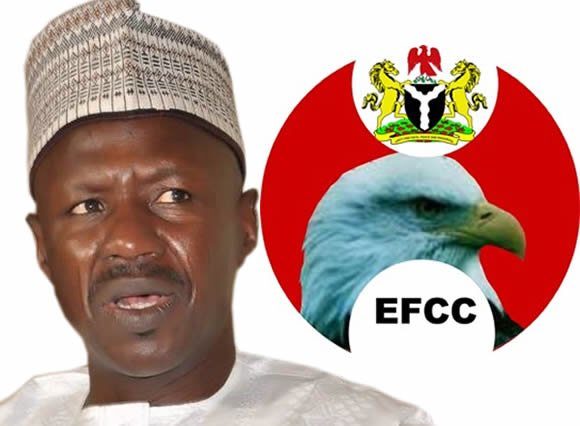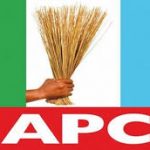...To get all news updates, Join our WhatsApp Group (Click Here)
Also Join our WhatsApp Channel (Click Here)
After five years as the public face of the federal government’s anti-graft crusade, the suspension and arrest of Ibrahim Magu, acting Chairman of the Economic and Financial Crimes Commission (EFCC), who is being investigated for corruption is a major blight on the toga of President Muhammadu Buhari’s war on corruption that reinforces the public perception that the whole anti-graft war is just a smokescreen to harass and intimidate perceived opponents of the regime. Notwithstanding his offense, the public drama in which a combined team of policemen and officers of the Department of State Services (DSS) invaded the office of the EFCC to arrest Magu; whisked him off manu militari to face a presidential panel investigating allegations of corruption against him is shameful and most embarrassing to Nigerians. It is a debasement of Nigerian democracy and a sad manifestation of the rule of force over the rule of law. Although the Presidency touted the incident as an affirmation that no one under the Buhari administration is above the law, such brigandage lowers the country’s image before the comity of nations. This is the tragedy of Nigeria.
After over 20 years of democracy, there should be no more room for such conduct. The situation could have been handled more professionally without portraying the DSS as a Gestapo organization. This must never be allowed to repeat itself. Magu has been reportedly detained at the Police Force Criminal Investigation Department in Area 10, Abuja, on the orders of the presidential panel, which continue to question him over “weighty” allegations of misconduct. This is an insult to the Nigerian people carried too far, which does little credit to the image of President Buhari, whose promise of a new dawn in democratic governance and respect for the rule of law formed the plank of his political covenant with the people prior to his electoral mandate in 2015.
To begin with, a person of Magu’s status ought to be treated with dignity and respect in a democratic dispensation. The cavalier manner, in which he was arrested from his office after Buhari had recently applauded his services to the country and personally assented to Magu’s plan to auction over 400 luxury cars forfeited by internet fraudsters, was most undeserving. Without prejudice to any investigation, it is worth noting that it is not within the remit of the presidential panel to probe acts of corruption by public officials. The arrest and detention of Magu certainly need to be justified, but such justification cannot be in violation of due process and the right of presumption of innocence until proven guilty, which Magu is entitled to as a Nigerian citizen. That the presidential panel is treating Magu as if he is a convicted felon is most unfortunate. What if Magu ends up being exonerated?
Besides, a presidential panel is not a court of law and has no authority to order Magu to be detained without bail. In fact, Magu has the right to bail while the investigation is conducted. To subject him to questioning and remanding him in detention even when no competent authority or jurisdiction has established that he is a flight risk; are clear violations of Magu’s fundamental rights, and respect for the dignity of his person and personal liberty as guaranteed by Sections 31 and 35 of the Constitution. Such barefaced violation of the right to privacy and dignity cannot be in the best interest of democracy; it is lawlessness. The president on whose authority the panel is acting must guard against repeating such lawlessness and acting in a manner suggesting a disdain for due process. As for Magu, he should be released immediately or charged in court.
For the avoidance of doubt, the official narrative that the panel is probing allegations of corruption against Magu following a damning memo by the Minister of Justice and Attorney General of the Federation (AGF), Abubakar Malami (SAN) is laughable and defies logic. Nigerians have not forgotten the brazen show of megalomania, when as acting President, Yemi Osinbajo sent a letter to the Senate re-nominating Magu as EFCC chairman, after the Senate had rejected his candidacy, citing a DSS security report with the same corruption allegations, which the same AGF, Malami, later claimed to have investigated and cleared Magu of any wrongdoing.
Without equivocation, Nigerians were deeply concerned about the wide-reaching implications of the president acting like defense attorney and holding brief for a man indicted for corruption by the legislative arm of government after the Senate deemed Magu unfit to hold public office. In civilized democracies, Magu himself, seeing that the matter was getting out of hand could have voluntarily withdrawn his nomination. This would certainly have fetched him accolades and leave Nigerians to fight the battle for him in the court of public opinion. But thanks to Buhari’s nonchalance, Magu stayed on for five years. In all, maintaining Magu as acting EFCC chair only authenticated impunity. With Buhari’s total backing, Magu wage a political vendetta and witch-hunt against Buhari’s perceived opponents, including loyalists of the Goodluck Jonathan administration. In the process, Magu stepped on many toes and made many enemies. The list is long and endless.
Former Defence Minister, Lt Gen Theophilus Danjuma (retd) recently visited Buhari. The billionaire oil mogul was seething with rage and anger that the check he issued to purchase an aircraft bounced! Danjuma was informed by his bankers that the order to withhold payment came from Magu! Aso Villa sources said Buhari bent over backward to convince Danjuma that he knew nothing about the incident but the sources also pointed out that Magu read the president’s mind and picked up the signal to finger Danjuma when Buhari dropped Danjuma’s protégé, Ibe Kachikwu from his cabinet. A few weeks before that incident, the Minna home of former military Head of State, Gen Abdulsalami Abubakar was raided and ransacked by EFCC operatives. Buhari also got to know only after the event had happened.
While neither Danjuma nor Abdulsalami is above the law, the instruments of state power should never be used to harass and ridicule citizens. Besides, a man who would take on the high and mighty, including members of the president’s immediate family, must be above board both in his private thinking and public action. Magu failed on both counts: in the past five years, Magu has made many conflicting claims about hundreds of billions of recovered looted funds and assets but subsequent auctions for recovered assets, resulted in choice properties being doled out to his cronies. Since in Abuja, like Washington DC, everything leaks and everyone knows which skeleton is in which cupboard (including who is sleeping with whose spouse), it didn’t take long for Buhari to become inundated with petitions how Magu and his cronies were re-looting the recovered looted funds.
Surprisingly, on November 22, 2017, Buhari appointed a three-member committee to audit all assets recovered by agencies of the federal government from May 29, 2015. Headed by Olufemi Lijadu, who later became chairman of the Securities and Exchange Commission (SEC), the panel was given four months to complete their assignment but ended up spending ten months. But even before they submitted their report, then Finance Minister, Kemi Adeosun, noticed discrepancies from the figures that were emerging and sent Magu a memo seeking clarification on the recoveries “based on the information available to the Office of Accountant-General of the Federation.” According to Adeosun, the attention of her ministry had been drawn to “recovery figures in media reports by the EFCC that do not reconcile with the records of the ministry” asking Magu to “clarify where this cash recoveries have been deposited and provide accompanying evidence.” Magu ignored the memo.
Meanwhile, the AGF to whose office Magu should ordinarily report (but doesn’t out of sheer arrogance) bided his time before writing a damning memo to Buhari regarding the report on recovered assets, which became the basis for Magu’s suspension and arrest. All that notwithstanding, Buhari’s volte-face after keeping Magu in office for five years is the hypocrisy that reduces the presidency to one that will go to any length to pander to the ego-tripping of the president’s men, even at the risk of compromising Buhari’s own integrity. It needs also to be stated that at the topmost management of the public, respect is mutual and reciprocal for the smooth running of the state. Such mutuality is dictated by the decorum exercised by authorities in the discharge of their duties. The government should treat the office of people like Magu with some dignity. They should be treated at their exit, in the same manner, they were treated when they held office. Magu’s office invasion and arrest fell short of this required decorum, for it diminishes the office of the EFCC chairman and debases the ethos and values of Nigeria’s preeminent anti-graft agency. By elimination, it is an index of what Nigeria does not value.
Against a man who prosecuted Buhari’s war on corruption with such messianic zeal, the barbaric arrest was nothing more than whimsical and disdainful impunity, which left much to be desired about the cantankerous temperament of the president himself. Like Nuhu Ribadu, Magu’s ongoing ordeal to the detriment of his office merely advertises the culture of impunity that holds the nation up to public ridicule and does little credit to the President’s image as a statesman. But far more than anything else it engendered, the indecorous public humiliation of Magu remains a national embarrassment and an imprudent display of statecraft.
Source: Huhuonline.
You can get every of our news as soon as they drop on WhatsApp ...To get all news updates, Join our WhatsApp Group (Click Here)
Also Join our WhatsApp Channel (Click Here)
















